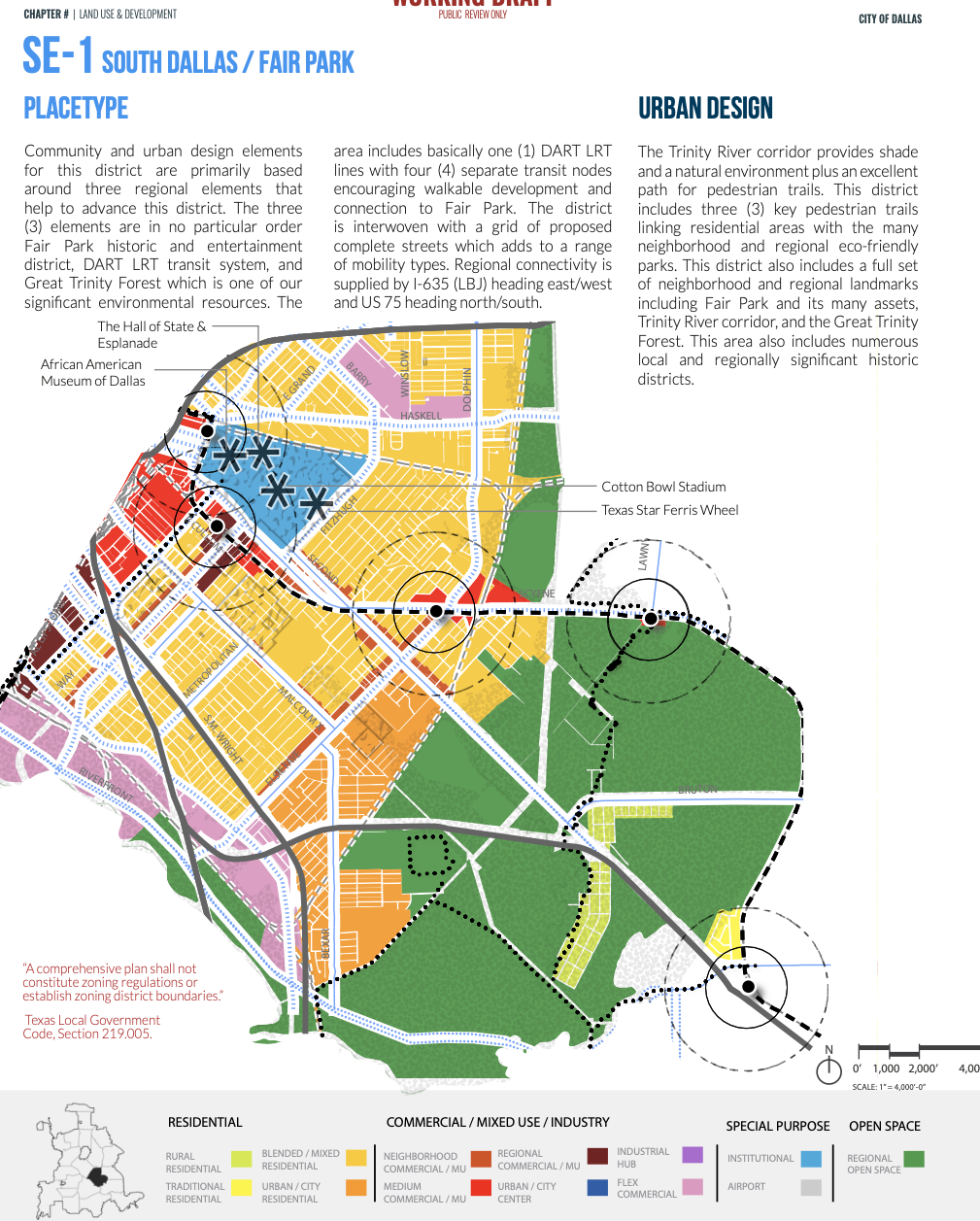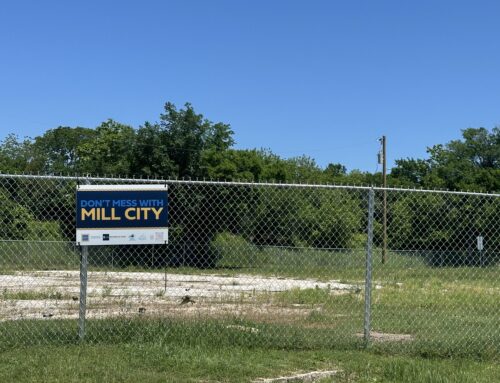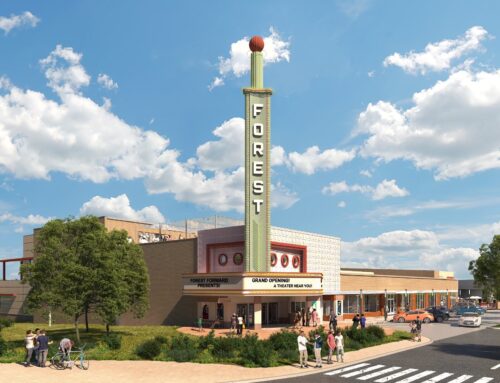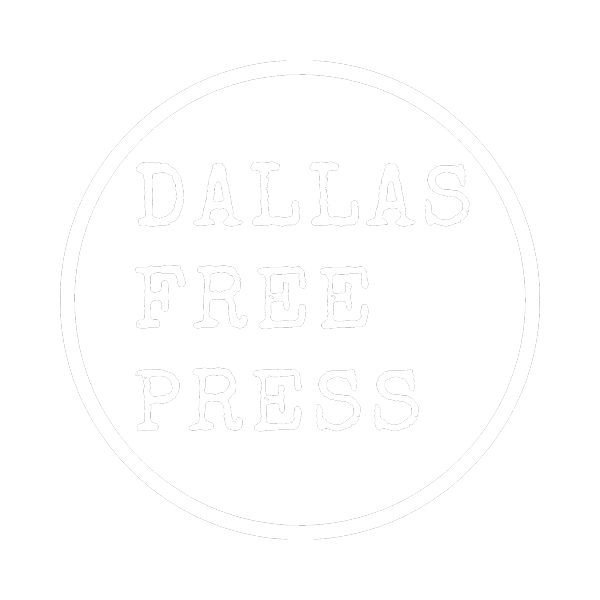City shows South Dallas residents big plans for land use in their neighborhood
News Based on facts, either observed and verified directly by the reporter, or reported and verified from knowledgeable sources.
Jamie “JJ” Reynolds looks over Forward Dallas’ list of over 50 community development goals for South Dallas.
On the poster boards displayed on easels around the room: goals for zoning, economic development, infrastructure, housing.
Among the many proposals for zoning and infrastructure improvements, Reynolds says she supports programs that funnel money to neighbors who want to rehab their historic homes, such as the Home Improvement & Preservation Program. But, she says, it’s important for residents to have help navigating these resources, otherwise no one will use them.
“The program should definitely be a little more user friendly. Folks should be coming out to walk them through the processes,” Reynolds says.
She hears from senior citizens in the neighborhood who receive constant calls from people trying to convince them to sell their homes.
“I’m not a fan of these poachers coming over and abusing South Dallas,” Reynolds says.
Reynolds, a 40-year resident of South Dallas and founder of MORE Parrallax Defined, was one of about 50 people at a Sept. 14 town hall meeting at Cornerstone Baptist Church, discussing the City of Dallas’ proposed plans for South Dallas neighborhoods.
Forward Dallas, created by the City of Dallas’ Planning and Urban Development department, is the first city-wide comprehensive plan for Dallas. Staff members are listening to residents in communities all over Dallas to find out what neighborhoods want for their communities. This plan, originally launched in 2006 and revived in early 2021, will be reviewed by the City Plan Commission and the Comprehensive Land Use Plan Committee before it moves to a City Council vote in November.
Reynolds and other attendees were given stickers to rate the revised plan’s goals: red for opposition, yellow for neutral and green for support. They also were given blue stickers, to prioritize certain projects over others. By the end of the night, there were only two red stickers next to an objective that would allow for more multiplexes in South Dallas. Neighbors present said that the increasing number of these duplexes, triplexes and quads, can have negative effects on single-family homes.
Multiplex homes can be a tool for affordable housing, with several residences constructed on a single parcel of land. However, District 7 Plan Commissioner Tabitha Wheeler-Reagan says that even though more affordable housing is needed, it’s important that the homes fit the neighborhood’s style.
“Just because we’re having a housing crisis does not mean that we need just anything,” Wheeler-Reagan says. “You can have duplex districts, and the reason why [neighbors are] so upset about duplexes is because we had some duplexes that were built in a multifamily area, and the design standards were horrible.”
Wheeler-Reagan says the feedback from these Forward Dallas meetings help inform her decisions as the plan commissioner. City planning staff, including Wheeler-Reagan, are also working with neighbors on the South Dallas/Fair Park Area Plan. This 5-year plan considers area-specific issues and possible solutions. This is different from Forward Dallas that looks at land use across the city for the next 20 years.
“We need to make sure that our neighborhood associations, our business associations, and even those in office, to make sure that we are in communication,” Wheeler-Reagan says. “Being the zoning commissioner, I want to make sure that I’m accessible, and the community around zoning cases get input.”
South Dallas resident Leonard Nolan expressed concerns about various vacant lots and homes. He says the city needs to be more creative with repurposing efforts, citing the Kathryn Joy Gilliam Museum, which reopened in March following two intentionally set fires, as a positive example.
“[In New Orleans] they said OK, we got so much [vacant space] that we want to give, let’s let some of the artists move into the house and turn it into a museum,” Nolan says. “Let a non-profit move in here that repairs the neighborhood, let them have that house. No one’s doing anything with it.”
In addition to her role with the South Dallas/Fair Park Area Plan, Wheeler-Reagan is also on the City Plan Commission. She will review and edit the Forward Dallas plan before it is sent to the City Council for a vote. With both of these roles, there’s one question she uses to consider what businesses should be brought into the neighborhood.
“When we first started this, we were asking, ‘What do you leave South Dallas for on Saturday morning?’ If you’re leaving South Dallas for something on Saturday morning, we need those types of businesses,” Wheeler-Reagan says. “With the changes that come forward, we hope to attract new businesses.”

Chief planner Patrick Blaydes says he’s trying to give neighborhoods more control to retain their individual characters. Blaydes says Forward Dallas is focused on breaking up Planned District 595, a 5,000-acre planned district across South Dallas. Right now, the entire area acts as one unit, which makes it difficult for neighbors to regulate their block or neighborhood through neighborhood stabilization overlays, conservation or historic districts.
“There’s really not a one-size-fits-all solution for preservation here in South Dallas,” Blaydes says. “By removing those residential neighborhoods from [PD 595], you allow them to pursue their own individualized preservation efforts … something that works for those specific communities without having to worry about all the other communities in South Dallas.”
Neighborhood-specific rules could help protect historic homes and prevent new developers from building homes that don’t meet the community’s standards. However, Reynolds says, Dallas has a poor reputation for preservation, and she and other neighbors don’t trust that the city can both move forward and preserve the past.
“There’s no one there fighting to keep that history, and before you know it, all of that is gone,” Reynolds says.
Community meetings will continue through the beginning of October, and residents across the City of Dallas can find ways to be involved on the Forward Dallas website.
Additional reporting by Brianna Patt of our partner newsroom, the Dallas Weekly.
Share This Story, Choose Your Platform!
Official Title:
Report for America Corps Member





